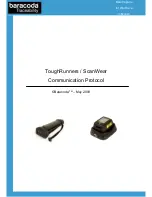
12.1.3 ARP Scanning
ARP (Address Resolution Protocol) is used to analyze and map IP addresses to the corresponding
MAC addresses so that packets can be delivered to their destinations correctly. IP address is the
address of the Host on Network layer. MAC address, the address of the Host on Data link layer, is
necessary for the packet to reach the very device. So the destination IP address carried in a
packet need to be translated into the corresponding MAC address.
ARP functions to translate the IP address into the corresponding MAC address and maintain an
ARP Table, where the latest used IP address-to-MAC address mapping entries are stored. When
the Host communicates with a strange Host, ARP works as the following figure shown.
Figure 12-3 ARP Implementation Procedure
(
1
)
Suppose there are two hosts in the LAN: Host A and Host B. To send a packet to Host B,
Host A checks its own ARP Table first to see if the ARP entry related to the IP address of
Host B exists. If yes, Host A will directly send the packets to Host B. If the corresponding
MAC address is not found in the ARP Table, Host A will broadcast ARP request packet,
which contains the IP address of Host B, the IP address of Host A, and the MAC address
of Host A, in the LAN.
(
2
)
Since the ARP request packet is broadcasted, all hosts in the LAN can receive it. However,
only the Host B recognizes and responds to the request. Host B sends back an ARP reply
packet to Host A, with its MAC address carried in the packet.
(
3
)
Upon receiving the ARP reply packet, Host A adds the IP address and the corresponding
MAC address of Host B to its ARP Table for the further packets forwarding.
ARP Scanning function enables the switch to send the ARP request packets of the specified IP
field to the Hosts in the LAN or VLAN. Upon receiving the ARP reply packet, the switch can get the
IP address, MAC address, VLAN and the connected port number of the Host by analyzing the
packet and bind them conveniently.
Choose the menu
Network Security
→
IP-MAC Binding
→
ARP Scanning
to load the following
page.
154
















































